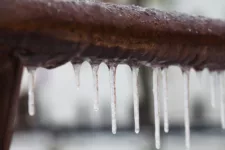Winter is right around the corner. When temperatures dip below zero, your pipes are at risk of freezing and potentially bursting. Taking steps to winterize your pipes today will help prevent costly repairs in the future – and a call to the plumber.
Keep Your Faucets Dripping
One simple way to keep your pipes from freezing is to leave your faucets dripping, especially those near exterior walls.
You’ve probably heard this advice before, but you may not know why it’s so effective.
Allowing the faucets to drip eliminates pressure that often builds up between ice blockages and the faucet. So, if the pipe still freezes, the dripping action should prevent the pipe from bursting.
The dripping may also prevent freezing because there’s a steady flow of warmer water running through the pipes.
Insulate Your Pipes
Insulating your pipes is one of the most effective ways to winterize your pipes. Pipes are more vulnerable to freezing when temperatures dip below 20 degrees, so insulation can help prevent this from happening.
Before you run out and buy insulation, consider the average temperatures in your area. The colder the temperatures, the thicker the insulation should be.
Pipes in unheated areas are the most vulnerable to freezing, so focus on these areas. You might also wrap the pipes in heat-tape before the insulation to add an extra layer of protection.
Be extra careful with pipes that have frozen in the past or have been recently repaired, as they are more vulnerable to damage.
Seal Cracks
Even the smallest of cracks allow cold air to seep in, which makes your pipes more likely to freeze. Look for holes or cracks along the exterior foundation and walls of your home.
Fill in any gaps you find with caulking or spray foam insulation. Larger cracks will need the spray foam.
Sealing cracks will help prevent freezing and save you money on energy costs.
Keep Your Cabinet Doors Open
Heat is the best defense against freezing pipes. Open all cabinet doors under the sinks in your home to allow more heat to reach the pipes.
Don’t Forget the Pipes Outside Your Home
The pipes outside of your home are even more at risk of freezing than the ones inside of your home. To protect these pipes, disconnect and store away your garden hoses.
If you can, shut off your external faucets and drain the water. Now is also a good time to turn off and drain your sprinkler system. A damaged pipe can lead to costly repairs to the entire sprinkler system.
What Happens if a Pipe Freezes?
What if you’ve taken steps to prevent pipe freezing, but it happens anyway? Signs of frozen pipes include:
- Turning on the faucet, but nothing comes out.
- The water is turned off, but you still hear rushing water.
In the latter case, the sound of the rushing water may be a sign that you have a leak somewhere.
If your pipes have frozen, do not use a blow-torch to try and defrost them. Many homes catch fire this way.
Here’s what you should do instead:
- Turn off your water lines immediately. The waterline shut-off may be in the basement, garage, underground or in the laundry area.
- Completely open the faucet closest to the frozen pipe.
- Use a hand-held dryer to defrost the pipe instead of actual fire.
- Call a plumber.
If you don’t want to use a hand dryer, you can use a heat lamp or a space heater to thaw frozen pipes. Heat tape can also help thaw the frozen pipe.
It’s not the freezing of the pipes that’s the problem; it’s the thawing. In many cases, the ice acts as a block in the pipe, and once that plug is thawed, it can cause water to spill through the cracks in your pipes.
It’s not uncommon for pipes to freeze in the winter. But taking steps to prevent the pipe from bursting is important. Draining the pipes in your home will help eliminate the pressure in your pipes that can cause bursting.
Winterizing your pipes will help prevent a call to the plumber – and a mountain of headaches. If your pipes do wind up bursting, don’t try to fix the problem yourself. Call in a professional who can take care of the issue properly.








